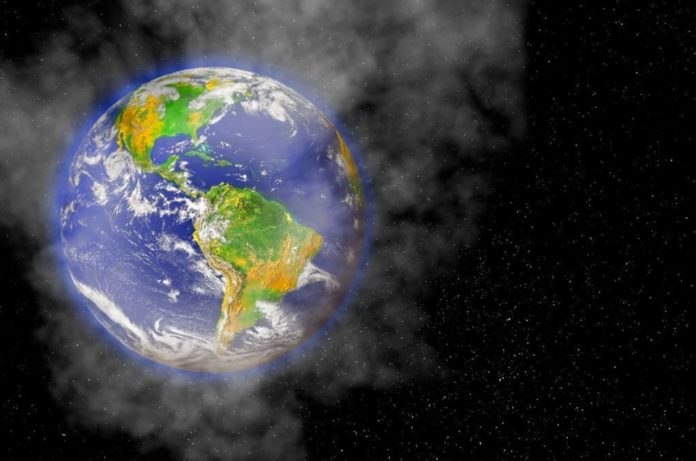Global warming might become “catastrophic” for civilization if temperature rises exceed predictions or trigger cascades of events that we have yet to explore or both. The world needs to start getting ready for a “climate endgame” that might happen.
This is what an international team of researchers, led by the University of Cambridge, says. They have come up with a plan for research to deal with bad-to-worst-case scenarios. These include everything from losing 10% of the world’s population to the end of the human race.
In a paper that was just published today in the journal Proceedings of the National Academy of Sciences, the researchers make a plea to the Intergovernmental Panel on Climate Change (IPCC) to devote a future report to catastrophic climate change in order to stimulate research and educate the general public.
“There are plenty of reasons to believe climate change could become catastrophic,” said lead author Dr. Luke Kemp, “even at modest levels of warming.”
Every mass extinction event has involved climate change, according to the study. It has influenced history and helped bring down empires. Even the modern world appears to have evolved to fill a specific climatic niche, he claimed.
“Paths to disaster are not limited to the direct impacts of high temperatures, such as extreme weather events. Knock-on effects such as financial crises, conflict, and new disease outbreaks could trigger other calamities, and impede recovery from potential disasters such as nuclear war.”
Kemp and colleagues think that the impacts of global warming of 3°C and beyond, as well as the associated catastrophic hazards, have been inadequately explored.
The team’s modeling shows that by 2070, two billion people could live in places where the average annual temperature is over 29 °C. These regions are among the most populous as well as some of the most unstable politically.
Around 30 million people in the Sahara and Gulf Coast are currently impacted by average annual temperatures of 29 degrees, according to co-author Chi Xu of Nanjing University.
By 2070, two nuclear powers and seven maximum containment laboratories holding the most hazardous viruses will be directly impacted by these temperatures and their social and political ramifications. There is a significant chance that the consequences may be terrible, he said.
According to the IPCC study from last year, there is about an 18% risk that temperatures would climb above 4.5°C if atmospheric CO2 doubles from pre-industrial levels, which the globe is halfway to.
Kemp, on the other hand, co-authored a “text mining” study of IPCC reports earlier this year, which discovered that IPCC estimates have drifted away from high-end warming and toward lower temperature rises.
This builds upon his prior work demonstrating that extreme temperature possibilities are “underexplored relative to their likelihood.” Kemp remarked that “we know least about the scenarios that matter most.”
The authors of the PNAS publication propose a research program that addresses what they refer to as the “four horsemen” of climate change: famine and malnutrition, extreme weather, conflict, and vector-borne diseases.
According to them, global warming poses a serious threat to the food supply, increasing the likelihood of “breadbasket failures” when the world’s most productive agricultural regions collectively collapse.
As habitats for both people and wildlife change and shrink, hotter and more extreme weather could also make it easier for new diseases to spread.
The authors warn that a breakdown in the climate would probably make other “interacting threats” worse, such as growing inequality, false information, democratic breakdowns, and even the development of new kinds of dangerous AI weapons.
In one scenario discussed in the article, technologically advanced superpowers engage in “warm wars” over massive projects to reflect sunlight and lower global temperatures as well as depleting carbon space.
According to academics, more attention should be paid to locating all potential “Hothouse Earth” tipping points, including those that could result in the disappearance of cloud cover, the release of methane from permafrost melt, or the loss of forests that serve as “carbon sinks.”
The Potsdam Institute for Climate Impact Research Director and co-author Prof. Johan Rockström noted, “The more we learn about how our planet functions, the greater the reason for concern.”
“We increasingly understand that our planet is a more sophisticated and fragile organism. We must do the math of disaster in order to avoid it,” he added.
“We need an interdisciplinary endeavor to understand how climate change could trigger human mass morbidity and mortality,” added co-author Prof. Kristie Ebi from the University of Washington.
Kemp continued, “We know that temperature rise has a ‘fat tail’, which means a wide range of lower probability but potentially extreme outcomes. Facing a future of accelerating climate change while remaining blind to worst-case scenarios is naive risk-management at best and fatally foolish at worst.”
Image Credit: Getty
You were reading: New Research Reveals A Grave Danger Posed To BILLIONS
